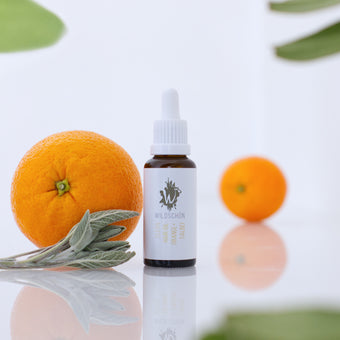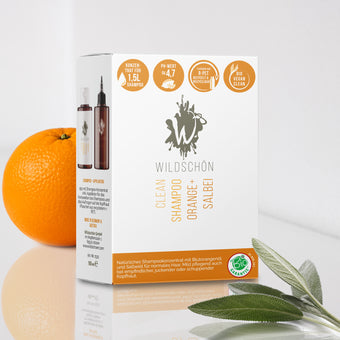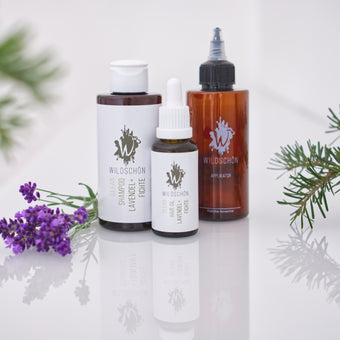What do vitamins have to do with healthy hair?
- Can we nourish our hair with vitamins in care products?
- Which vitamins can lead to hair loss?
- What are the functions of vitamins in shampoos?
Caring for our hair from the outside with shampoo and other products is part of our normal routine - for many even daily. It is not uncommon for shampoos to advertise that they contain vitamins or nutrients for “healthy” hair. But is that even possible? Can vitamins or nutrients in shampoo actually have an effect on our hair? Let's take a closer look at the topic of nutrients, nutrition and hair.
Let's start with a few basics: The hair life cycle
Hair has a life cycle too. Logically, at the beginning there is the growth phase, also called the anagen phase. It lasts between two and six years – quite a long time. This is followed by a two to three week recovery phase (catagen phase) in which the growth processes are stopped. Then comes the so-called resting phase (telogen phase), which lasts about three months. During this time, the hair root is no longer supplied with nutrients and the hair eventually falls out. Then it starts all over again and new hair grows. Maybe you were just wondering why we don't always end up completely without hair. This is because not all of your hair is in the same phase. About 80 percent of them are in the growth phase. That's why they have to be well cared for so that your mane is really magnificent. Which leads us straight to the next question: What does your hair need to be beautiful?
The vitamin ABC for beautiful hair
When body cells grow, the metabolism there runs at full speed. Because growth occurs through cell division – also in hair. So what does hair need to be beautiful? Strictly speaking, all vitamins, minerals and trace elements that your body needs, and they are also important for your hair. However, there are a few representatives who are particularly important to them. Here we present your most important hair helpers. First, let's look at which vitamins in your diet are important for your hair and scalp. Then we take a look at how useful vitamins are in care products.
You need vitamin A for the formation of hair sebum and collagen formation
It starts at the top of the alphabet with vitamin A. It is important for the formation of hair sebum, the body's own care substance for your hair. It is also involved in the formation and maintenance of hair in the hair follicle by supporting the formation of collagen. It also contributes to the fact that moisture can be stored better. A vitamin A deficiency can cause hair growth to be disrupted. Vitamin A is particularly found in animal products such as B. egg yolk, butter or cod liver oil. However, the precursor of vitamin A (carotenoids) is also found in dark green, yellow and orange vegetables and in yellow and orange fruits.
Biotin supports the formation of keratin
One of the most important helpers is vitamin B7 (also called vitamin H). Do not you know? That could be because its middle name, biotin , is mostly used. Strictly speaking, biotin is a coenzyme that is important for various processes in the body: It plays an important role in the development of hair and nails, it is involved in cell growth and it promotes healthy skin. When it comes to hair, the body needs biotin to create keratin. Keratin, in turn, is the main component of our hair. Because biotin is found in quite a lot of foods, biotin deficiency is rare in developed countries (and even with special diets). However, a biotin deficiency can be caused by certain medications (e.g. anticonvulsants) or intestinal diseases. These then prevent the absorption of biotin or cause an increased need.
Vitamin B6 is important for the utilization of proteins
Since a B vitamin rarely comes alone, here's the next representative: Vitamin B6 also helps keep your hair beautiful. The body needs it, among other things, to convert and incorporate proteins - i.e. for the metabolism. Proteins are also important for the formation of hair keratin. In addition, vitamin B6 also plays a role in the oxygen supply - and only with a good oxygen supply can the nutrients reach the hair roots. In addition, it supports the body in iron utilization. Luckily, vitamin B6 is found in so many foods that a deficiency usually only occurs in chronic indigestion or as a result of taking medication.
Folic acid is important for cell division
The next member of the B complex is vitamin B9 (sometimes called B11) and probably better known as " folic acid ". Wait - that's "that for pregnant women"! True, but it is important for all people. Because it plays an important role in cell metabolism, cell division and cell regeneration. And for hair growth it is important that both work, because processes related to tissue growth and cell division are also involved here. Whether it directly stimulates the root cells to divide and thus accelerates hair growth cannot be said in general terms, because here too it is more relevant whether there is a deficiency. Folic acid is mainly found in green vegetables and all types of cabbage. But also in animal products such as liver, egg yolk or dairy products.
Vitamin B12 deficiency can lead to hair loss
Last but not least from the B series: No. 12. Vitamin B12 is not only important for the blood and oxygen supply to your hair, but also for cell division and cell formation. It is involved in all growth processes, including that of the hair. Vitamin B12 also helps your body convert food into energy. And if you want to grow, you need energy – this also applies to hair! Vitamin B12 is mainly found in animal products. If you eat a vegetarian or vegan diet, you should check with your doctor whether you have a vitamin B-12 deficiency. A severe undersupply of vitamin B12 can also lead to hair loss. That's it for the B vitamins.
Vitamin C supports the metabolism in the scalp
Another helper related to the hair is mostly associated with the immune system: vitamin C. But it also plays a role in beautiful and clean hair. Vitamin C helps deliver oxygen and nutrients to your scalp through better blood flow. In addition, vitamin C improves the absorption of iron and thus supports the metabolism at the hair roots. It is also involved in the formation of collagen, which holds hair in the scalp. In addition, vitamin C protects against free radicals, i.e. against harmful metabolic products that can damage cells. You see: Vitamin C is a real all-rounder. Since vitamin C is mainly found in fruit and vegetables, you usually don't have to worry about a deficiency with a balanced diet.
Vitamin D is important for the hair follicle growth cycle
Let's continue in the alphabet: After C comes D - vitamin D . The so-called sun vitamin is not only good for our immune system and lifts the mood, but is also important for the hair. Because with a vitamin D deficiency, the growth cycle of the hair follicles is changed or interrupted. However, only a small part of vitamin D is ingested directly through food, but 80 to 90 percent is formed through exposure to the sun on the skin. But that only works outside. Because the part of the sunlight that is important for this does not come through the window pane. The risk of vitamin D deficiency tends to be higher in winter, since there are fewer hours of sunshine and the sun is too flat on the horizon. Your family doctor can determine whether you are sufficiently supplied with vitamin D by means of a blood test.
Vitamin E ensures good blood circulation in the scalp
Vitamin E is another important helper from the ABC for beautiful hair. It contributes to the health of the blood vessels and to an intact blood circulation in the scalp. The blood vessels in turn supply the hair roots with nutrients. Like vitamin C, vitamin E protects cells from the damaging effects of free radicals. If you eat a balanced diet, there is no need to worry about a vitamin E deficiency, especially if dark green vegetables, vegetable oils or seeds are a regular part of your diet.
Iron and Zinc: Essential for cell division, including in the scalp
Iron is also one of the nutrients with an indirect effect on hair. In addition to supplying oxygen and nutrients, iron also serves as a building block for various proteins that are involved in cell division and renewal. Iron deficiency can even cause hair loss. Green vegetables in particular contain iron. Zinc not only starts with the last letter in the alphabet, but it's also the last hair helper we look at. The importance of zinc for your hair is shown not least by the fact that the food safety authority explicitly points this out and notes in its guidelines: Zinc contributes to the maintenance of normal hair. Zinc is also important for cell division. It is also important for the formation of keratin, the substance that hair is made of. Zinc is also important for the formation of collagen. This in turn keeps our hair firmly in the scalp. And that's exactly how we want it, our hair.
Vitamins & Co. in shampoo: advertising gimmick or effect?
One thing is clear: if you want beautiful hair, it needs an adequate supply of nutrients. The best way is an appropriate diet - after all, it's not just your hair that wants to be well cared for. Our body is a complex system. Even if we look at individual "subsystems" such as skin or hair individually, the main source of nutrients is intake through a balanced diet. We at Wildschön therefore do not see your hair health in isolation - we have a holistic view of your health. And there is a very simple reason for this: the keratin structure called hair is not living matter, otherwise cutting hair would hurt. So you cannot take in significant amounts of vitamins through your hair. If you don't eat a balanced diet, then no shampoo in the world can make up for it. But how useful are vitamins in shampoos?
Vitamins in shampoos: Local action on the scalp and hair
With many ingredients in shampoos or other cosmetic products, the manufacturers are mainly concerned with the most convincing marketing possible - not with real effects. Because you cannot absorb any vitamins through your hair, and only to a very limited extent through your scalp. At least the effect can only be proven to a very limited extent from scientific studies. But absorption through the skin is not impossible: Vitamin A, for example, can penetrate the upper layers of the skin and presumably support the renewal of skin cells and collagen formation there. Since vitamin A can be overdosed, the German Society for Nutrition is even critical of supplying it through the skin. Vitamins C and E help to tighten the skin, retain moisture in the upper layers of the skin and reduce inflammation. A shampoo with vitamin C can increase blood circulation in the scalp by massaging it in. Antioxidant vitamins may also provide scalp cells with some protection from free radical damage. Vitamin B5 can also support regreasing in the upper skin layer and help with cell formation. However, all of these effects are rather small – at least compared to the importance of vitamin intake through food. With vitamin C there is also a chemical process that takes place externally: the vitamin is an acid (ascorbic acid) that can dissolve scales, horny cells and excess sebum. It cleans gently and without great mechanical stress. Vitamin E also has physical properties that help smooth the hair's outer layer and thus bind the essential oils from care products in the hair, for example. And the product properties of shampoos can also be influenced by vitamins. The acidic vitamin C can be used, for example, to influence the pH value of a shampoo in order to set it ideally. Due to the acid, the vitamin also serves as a natural preservative, because an acidic environment can slow down the growth of numerous harmful organisms.
Conclusion: beautiful hair needs vitamins and nutrients from the inside and outside
Our hair grows for most of our lives. In order for this to work well and for them to look beautiful at the same time, they must be well supplied with nutrients and vitamins. You can't do this with just a shampoo and without a balanced diet. Nevertheless, the vitamins and nutrients contained in shampoos can have an effect: For example, they can penetrate the upper layers of the skin, support cleaning or smooth the hair layer. This, in turn, can help them shine because they retain moisture better. As a positive side effect, they also charge less statically because moisture increases their conductivity. You see: Vitamins are actually healthy - for your hair and the rest of your body. From our point of view, however, nutrition and hair care have an almost even more important thing in common: An optimal supply of good substances is only one side of the coin, the other is the avoidance of harmful substances. Our opinion: Conventional shampoo is the fast food of hair care - and natural shampoo is the logical alternative for your hair health.









